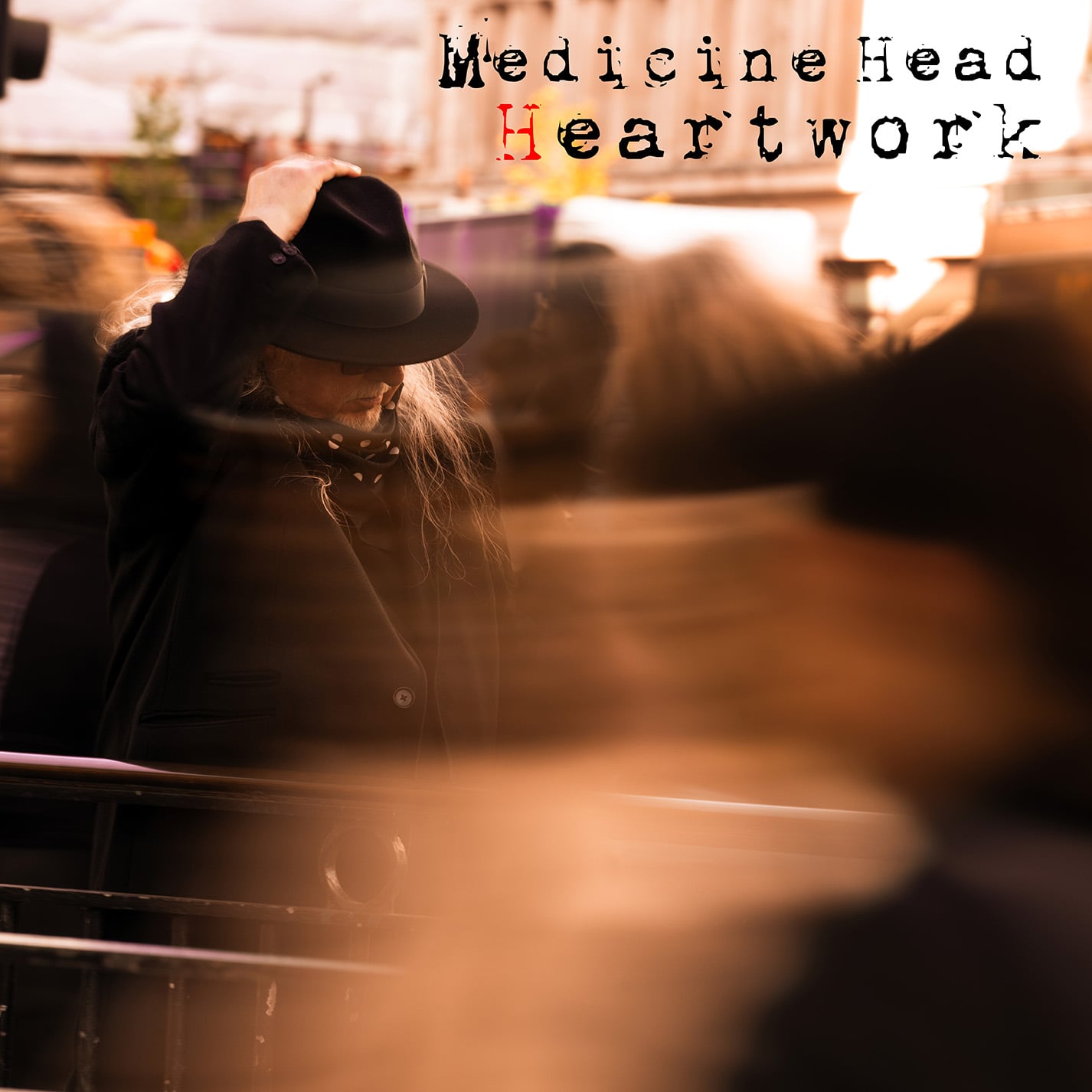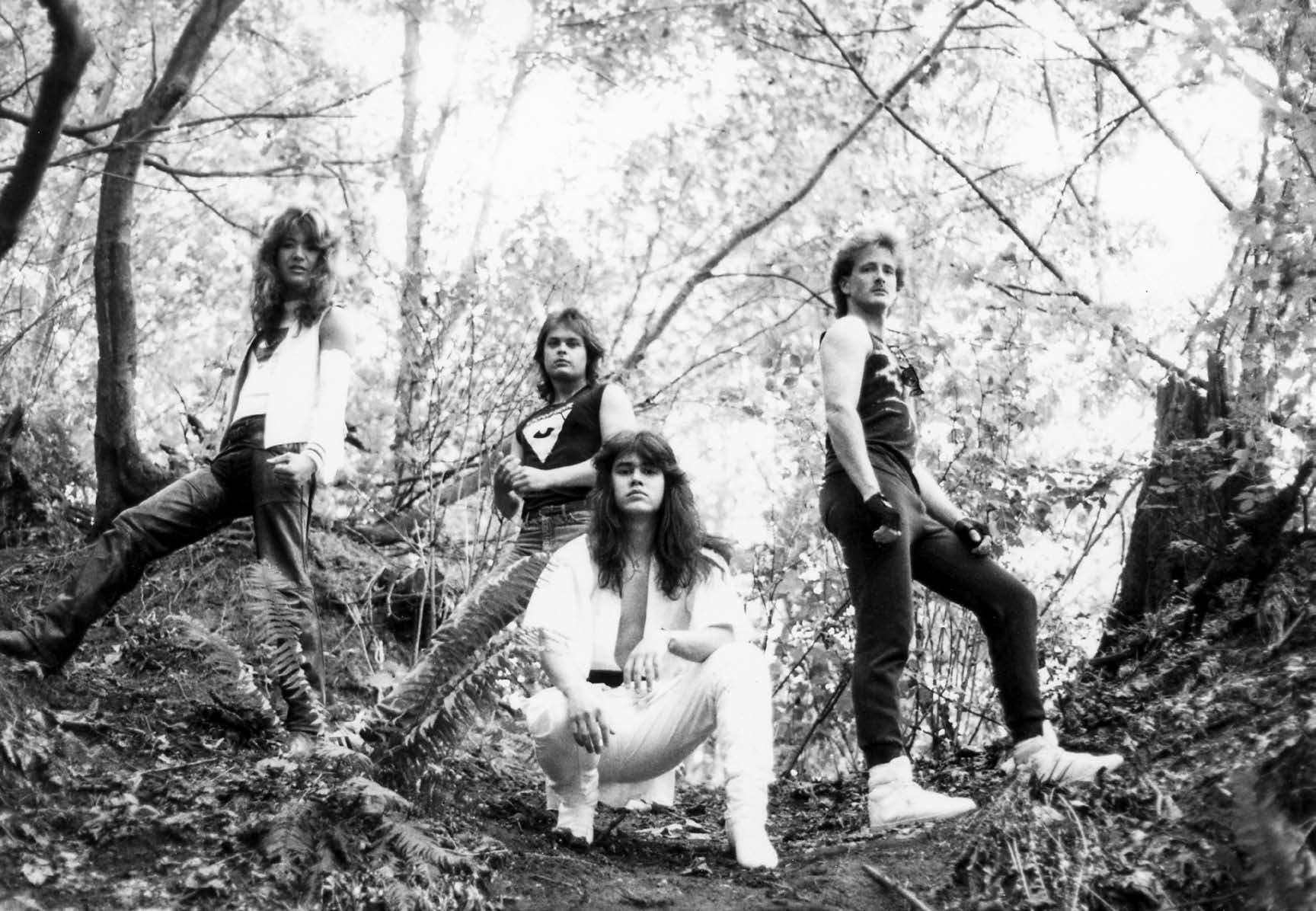‘Heartwork’ by Medicine Head | From a Studio of the Heart
‘Heartwork’ is the latest album by Medicine Head.
It’s often said that environment plays a key role in shaping our lives, but if there’s any truth in that view then it’s usually subconscious, barely ever considered consciously. Born in the rural midlands of England near Darlaston, often in the news because of the effects of mining on land and locals, including rebuilding that changes and perhaps strengthens, there’s an imaginative parallel: John Fiddler’s music and art (a prized local nature reserve may have seeded his life-long passions before and after Stafford Art College in the ’60s) explores and mines emotions that are at the heart of life buried by life’s geological strata in time. His songwriting is a craft, a determination to overcome life’s setbacks of environment and relationships, motivated while strengthened solely by love.
He grew up with creative sisters and their mother, a feminine nexus that along with environment seems to have been the artist’s first rocking fuel. The title too of his latest (Medicine Head: ‘Heartwork’) playing on artwork presumably, shows in a long trajectory during and after the first Medicine Head with fellow-student and close friend Peter Hope-Evans, a dynamic creative duo that began with ‘New Bottles Old Medicine’ in 1970 as the best-selling act on John Peel’s Dandelion (“one of the cheapest classic records of all time”, he had two of their singles in his all-time box of faves to hand).
Ever since the name was formed—literally good medicine for head and body, thought and action combined—the creativity of main song-writer John Fiddler has been good energy and emotion without fuss, even when a lean-mean duo during the era of prog’s over elaboration. (The album title ‘Dark Side of the Moon’ was first used by Medicine Head a year before nicked by those whose name escapes me). Encouraged by early supporters such as John and Yoko Lennon and Pete Townshend, they went on to have top 3 hits across Europe on Polydor with t.v. appearances and front-page articles in such as Melody Maker, Sounds and Jackie before splitting. Fiddler then fronted as the main songwriter both British Lions (ex-Mott the Hoople) and Box of Frogs (ex-Yardbirds) with such guests as Jeff Beck, Rory Gallagher, Steve Hackett and Jimmy Page. Both bands, who reached the Billboard 100, have again been reissued as have seven albums featuring Hope-Evans, among compilations and radio sessions.
The prolific songster’s credits include a co-write on UFO’s ‘Mechanix’ (‘We Belong To The Night’), and Morgan Fisher’s ‘Seasons’ as well as ‘Miniatures 2′ this century, while amid rumours of joining The Stranglers he was briefly in Freeway for their P’artners In Crime’ LP on Epic with John Coghlan (ex-Status Quo), Terry Uttley (ex-Smokie) and Ray Majors from British Lions, co-writing with him ‘Heart Of The Night’. Solo projects, alongside friends like the latest release, include ‘State Of The Heart’ (1992, reissued by Angel Air 2013 who released a ‘lost’ 70s album by Medicine Head), ‘Return Of The Buffalo’ (1995 Red Steel), expanded as ‘Big Buffalo’ (2000), and ‘Only The Roses’ (2005). Another well-reviewed solo (‘Fiddlersophical’ 2011 Angel Air) came out around best-of compilations on Polydor, Cherry Red, and Bellaphon (Germany).
In 2021 ‘Warriors Of Love’ was in a way a pendant to the latest work, though both stand-alone as originals of lyrical depth behind the deceptive veneer of modern culture; the absence of fillers is almost a trademark, unlike for many now. It came out on his new label Living Room Records, another pointer to the music being possible for anyone anywhere, his credo from the 60s after growing up listening to Muddy Waters, Howlin’ Wolf with Hubert Sumlin, and Lightnin’ Hopkins. ‘Heartwork’ was first earmarked for it too but a single (‘Living In A Bubble’) appeared alone in late 2023.
Mastered in Nashville by Alan Shipton, Fiddler sings, plays guitars, keyboards, harmonica and programmes, while Belinda Campbell adds backing vocals on half the ten tracks, Dzal Martin contributes various guitars, and Dave ‘Bucket’ Colwell (Bad Company; Humble Pie), recently seen on-stage with John Fiddler, lead-guitars the opener ‘Making Up For Lost Love,’ a tad like Gary Moore (no criticism of course) with its Chicago blues style singing over electric guitar licks and insistent riff. It possibly refers to a difficult relationship in Arizona a few years back, but like all his work is universal. Haunting vibrato and laid-back harmonica wisps “Let’s make a love song out of this tragedy” (Alibi) as Fiddler seeks to be enriched by what is positive in life.
‘Everybody Has The Blues (Sometimes)’, of which a version appeared on ‘State Of The Heart’, looks at the outside and inside with some nice arpeggio rhythm guitar in what might be a (non-country) nod or update to Merle Haggard. Rumbling boogie with harmonica and tambourine (‘Get Your Hands In The Air’), no puerile stadium anthem as fashion demands, vaguely echoes Dr. John, Tony Joe White or Fiddler’s own ‘Slip And Slide’ smuggled into Top Of The Pops in the seventies. ‘Livin’ In A Bubble’ muses on life today among governments who lie blatantly with fall-out that’s painful for everybody else. The longest track’s six minutes (‘Love Is Not A Dream’) features Dzal Martin on lap steel among the keys, when love can feel like being on death row proving it isn’t a dream, love is real. ‘Gotta Hold On’, its Americanized title and lyrics remind of a similarly-titled Tom Waits song just a star-grain—but only as Alpha Centauri is our nearest star after the sun. Subtle strings on a perfect late-night lullaby after a storm.
‘It’s All About The Love’ alludes to sheltering, be it from the rain or night as dawn rises, a healing tear-jerker for so many lives into this new century. ‘Blue Eyes’, a title distantly echoing what he said in an interview about his solo music career as “blue-eyes blues” to expand the imagination, this mid-paced track is evocative with chord runs and solos. The closer ‘Ridin’ In My Car’, a co-write with Martin, is a solid B-side for any single.
John Fiddler says he navigates by “soul compass”, which by inference reveals a process that can mine an essence, a single moment that James Joyce called epiphany and Virginia Woolf’s moment of being—what might in modern parlance be called cutting the crap to get to the nitty gritty. In crises or happier opportunities vital elements are exposed, what Walter Pater described as a time of focus where vital forces unite in their purest energy. In short, creativity can reveal truth about character and situations through vivid sensations in such significant movements as love and loss.
Also available from the artist’s website, the album is a beautiful edition (with tasteful booklet of lyrics) by Talking Elephant (TECD491), a label worth exploring. The full band sound true to earlier incarnations’ ethos, delivered in a voice still strong and distinctive, is a delight filtered through consistent musical integrity from a life lived the same way. The tools and ore here prove that the compass is still very much magnetically true.
Brian R. Banks
Headline photo: Danny Clifford
Medicine Head interview with John Fiddler




